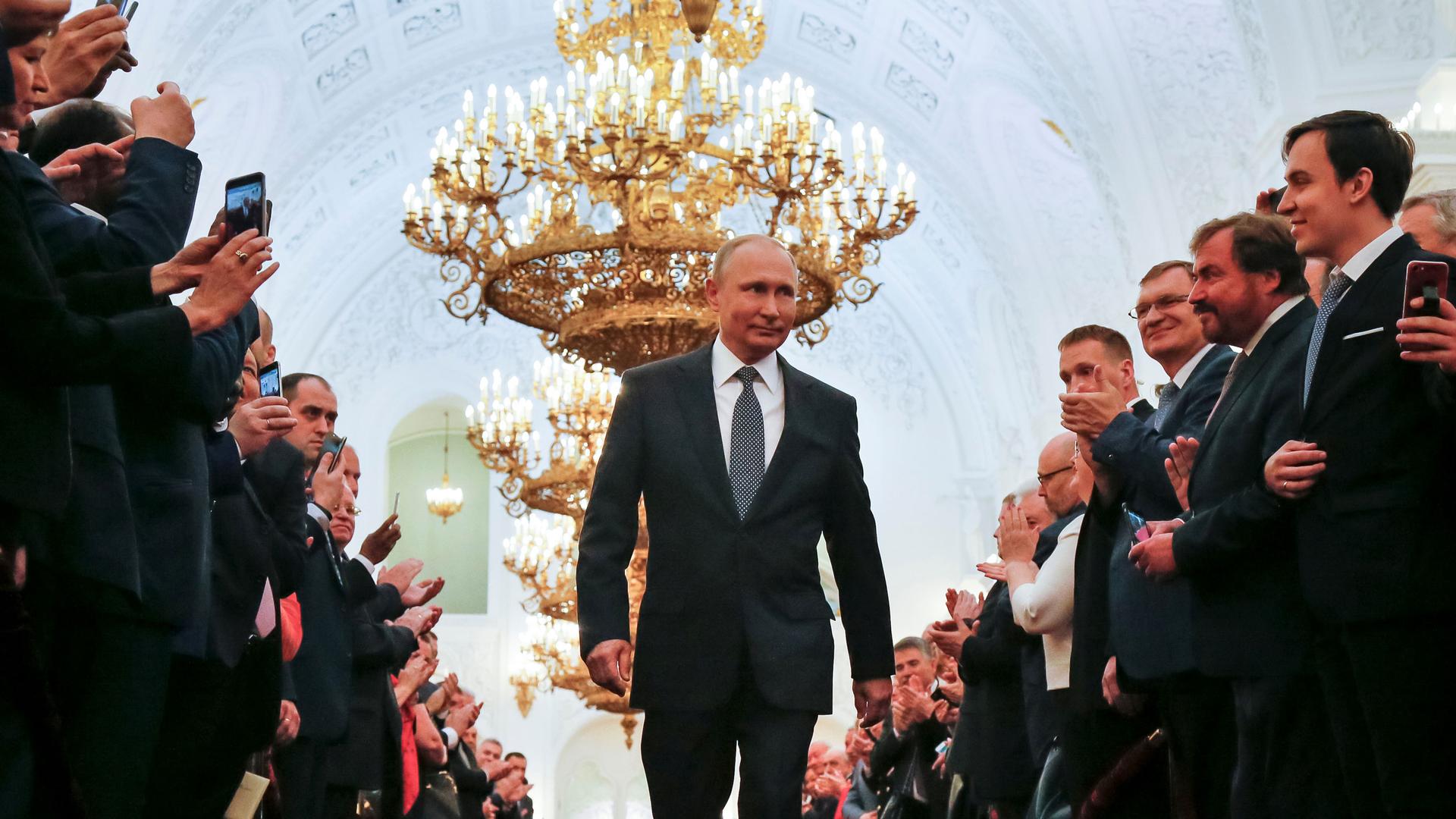20 years of Putin in power: A timeline
Russian President Vladimir Putin walks before an inauguration ceremony at the Kremlin in Moscow, Russia, on May 7, 2018.
For 20 years, Vladimir Putin has been synonymous with Russian leadership.
A former KGB officer and deputy mayor, Putin rose out of the shadows to power as the named successor after Boris Yeltsin’s resignation.
“I never heard that anyone from former KGB would be any close to this team,” said Andrei Illarionov, Putin’s former economic adviser.
It was unprecedented that a director of Russia’s national security service, the FSB, would someday lead the country.
While Yeltsin had succumbed to alcoholism and a crumbling post-Soviet state by the end of his rule in 1999, Putin quickly assumed the role of a powerful and popular leader, entering the scene as Russia’s disastrous economy began a period of rapid growth.
Related: In Russia, a ‘ghost empire’ rises
“When Putin came out he was such a contrast to Yeltsin. He was young. He appeared to be fit. He was almost monosyllabic in the beginning,” said Angela Stent, author of “Putin’s World: Russia Against the West and with the Rest.” “He was very quiet and withdrawn. Obviously, he changed after that.”
Stent says that in the early 2000s, Putin wanted to improve his relationship with the West. He even expressed an interest in joining the transatlantic treaty of NATO, but she says relations quickly soured.
Flipping back and forth between the role of president and prime minister to evade constitutional limits on power, Putin has long been at the helm of the Russian Federation, ruling for two decades in what he describes as a Russian brand of democracy, but what most analysts call an authoritarian regime. Indeed, Putin’s leadership has been marked with many scandals and cover-ups, though his approval ratings have remained generally strong — often surging in the wake of military action.
Related: Generation Putin
Opposition forces are making their voices heard in Russia, but Putin easily secured another six-year term as president in 2018. What will happen in 2024 is unclear, but here’s a look at some of the key points in the Putin era two decades in.
Putin rises
youtube://v/qPVVAy9df_YOn. Aug. 9, 1999, Russian President Boris Yeltsin names Putin as acting prime minister. This comes only eight years after Putin quits the KGB to run for office in St. Petersburg. Yeltsin steps down on Dec. 31, and Putin is named acting president.
Apartment bombings terrify Russians and spark war in Chechnya
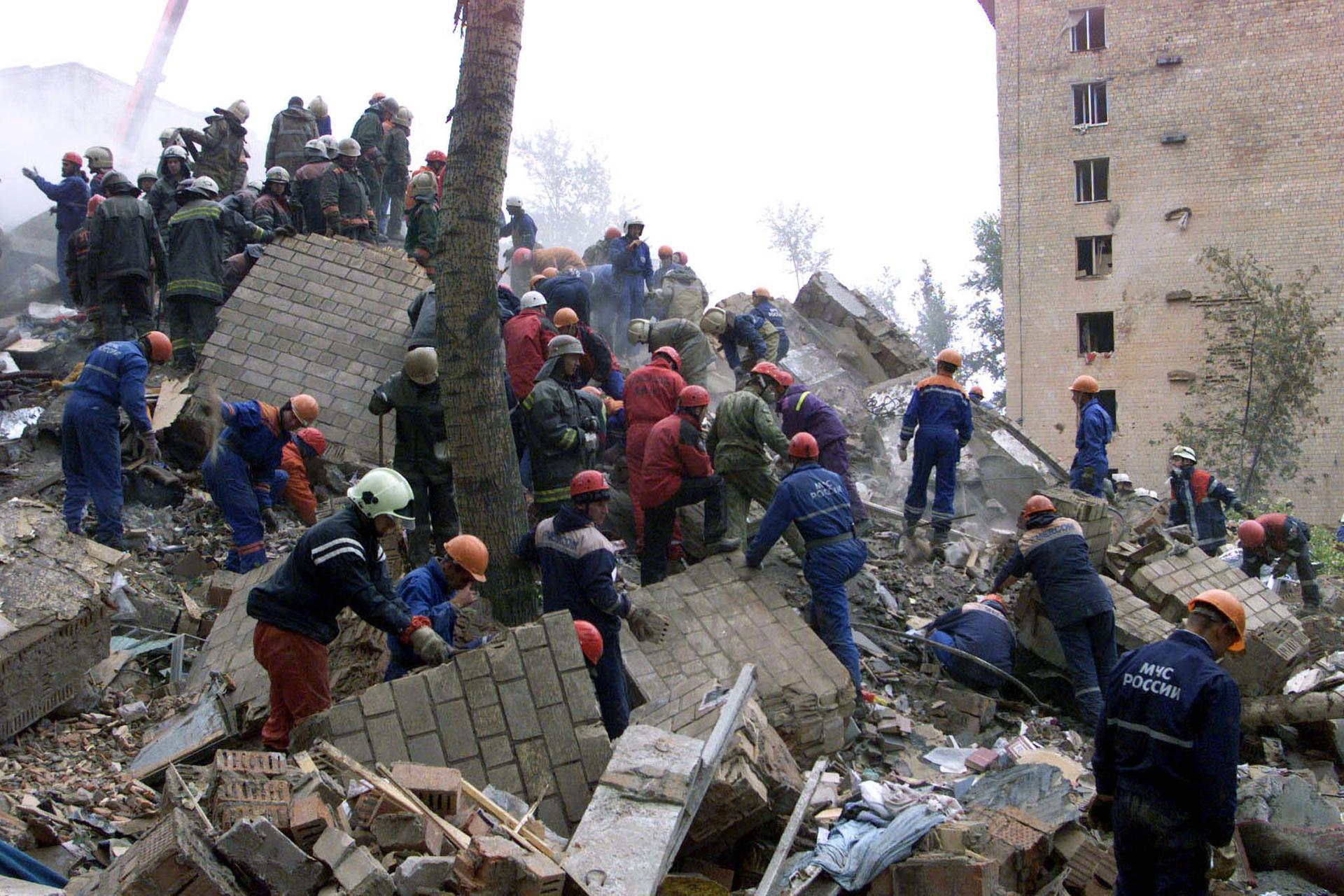
A series of explosions in September 1999 in Buynaksk, Moscow and Volgodonsk kill more than 300 and injure 800. Putin blames the bombings on Chechen rebels and coins what will become a catchphrase: “We will pursue them everywhere … We’ll catch them in the toilet. We’ll wipe them out in the outhouse.” The bombings provide justification to launch the Second Chechen War and helped Putin rise in popularity as he leads military operations against Chechen rebels. But investigations by journalists find that the FSB (successor agency to the KGB) is likely behind the incidents to provide a pretext to engage in Chechnya.
Author Angela Stent was watching this war carefully at the State Department, where she served in the Office of Policy Planning.
“It was obviously a bloody war,” she said. “And during that time, the way that the forces from Moscow — the Russian army — finally prevailed over the insurgents was by leveling the capital Grozny, much in the same way as we can see Russia and the Syrians have done in Syria.”
Putin’s first inauguration
Putin is inaugurated as president on May 7, 2000, after winning his first presidential election on March 26.
youtube://v/QrYHu8dH7w0Kursk submarine disaster
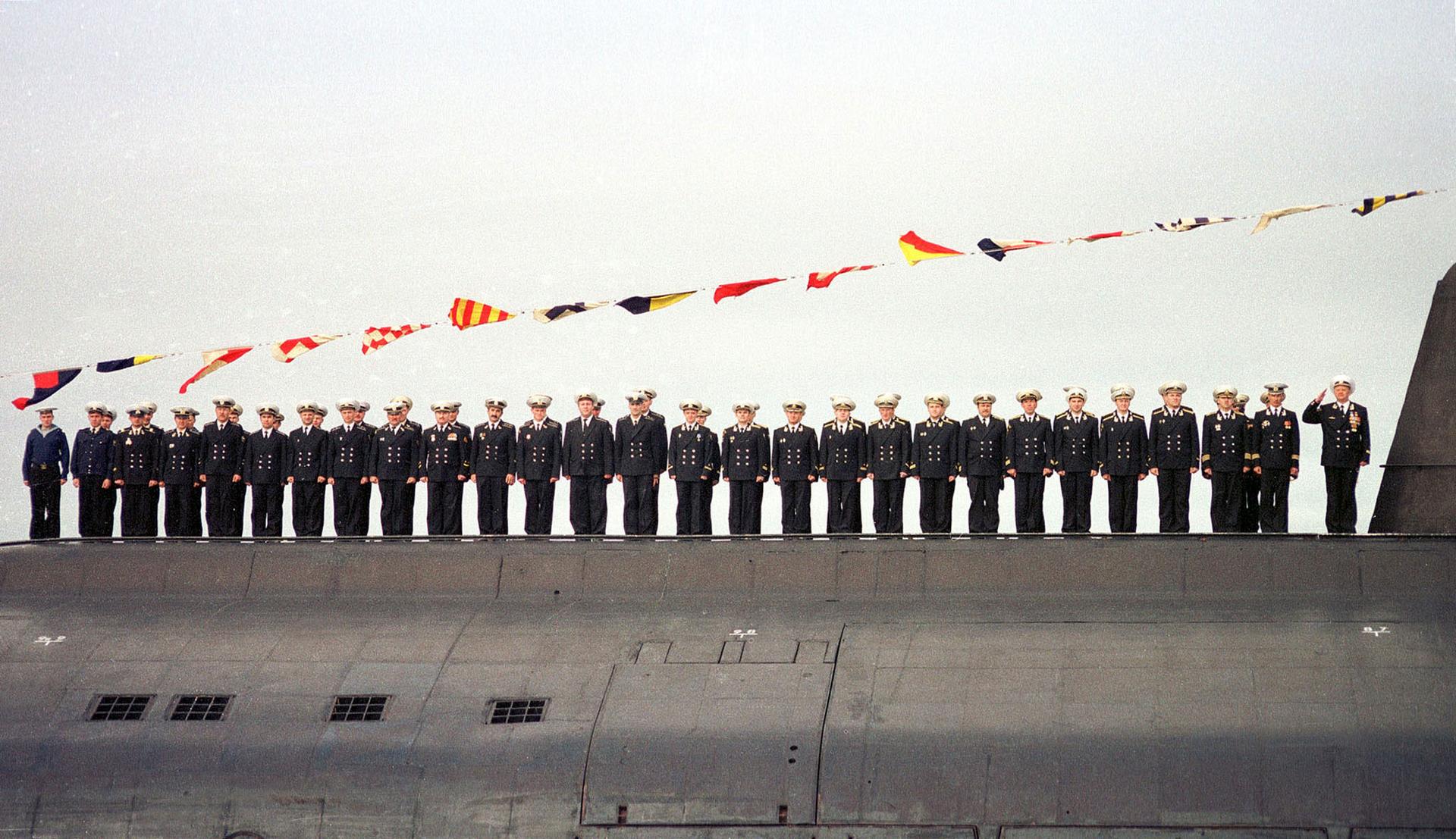
Just a few months into Putin’s presidency, the Kursk submarine sinks after an explosion of warheads and torpedoes during a naval exercise in the Barents Sea. The catastrophe leaves all but 23 of the crew members aboard dead, but the Russian government denies offers from foreign governments to assist in the rescue of surviving sailors until five days have passed. The seamen all die.
Boris Kuznetsov, the lawyer representing families of 55 of the lost sailors says, “The lies began with the sinking of the Kursk … When the Kursk sank, the government began interfering with the legal and law-enforcement systems. The government began gathering all the mass media under its control. The entire process of undermining democracy in Russia, in many regards, began with this.”
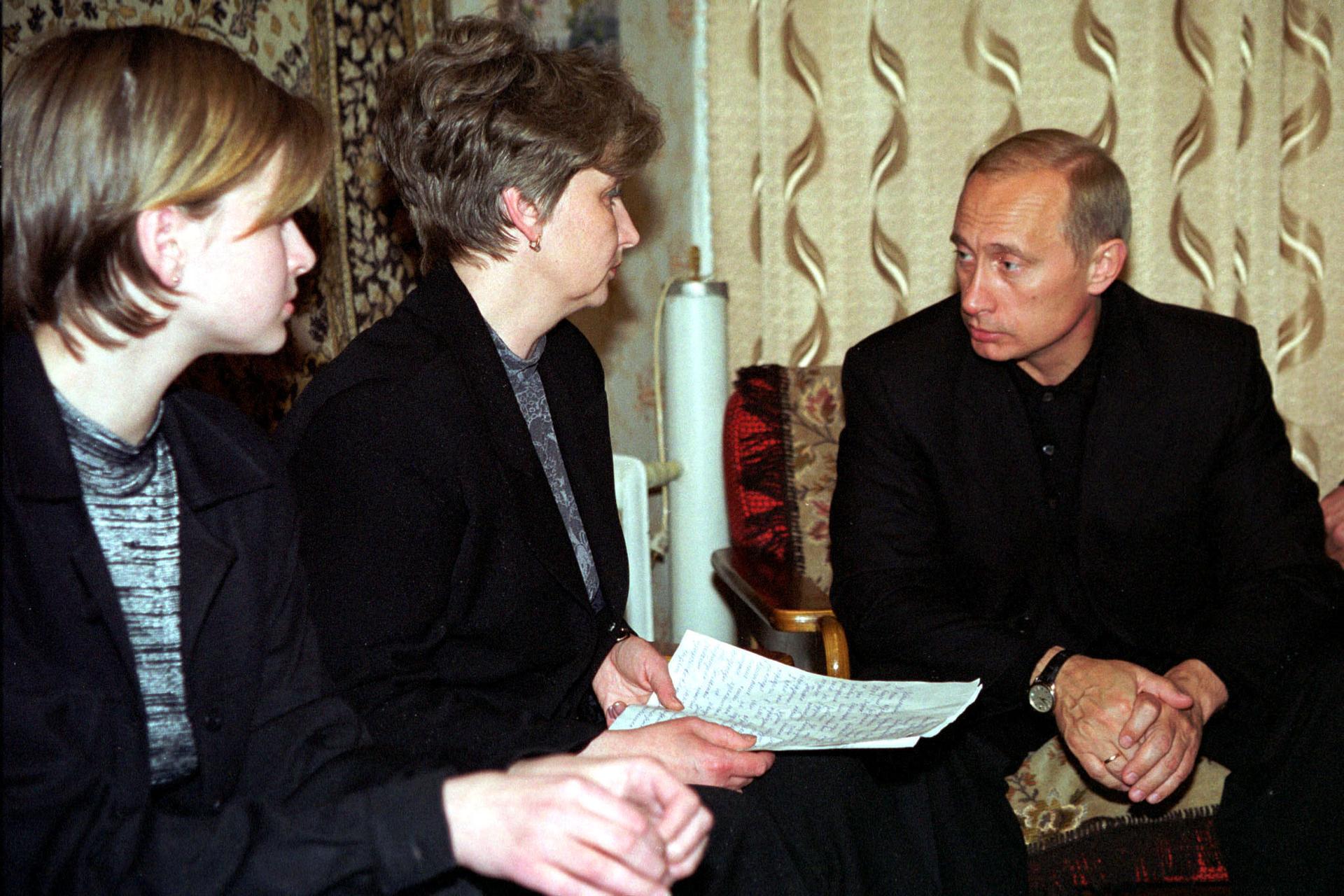
Moscow theater hostage crisis
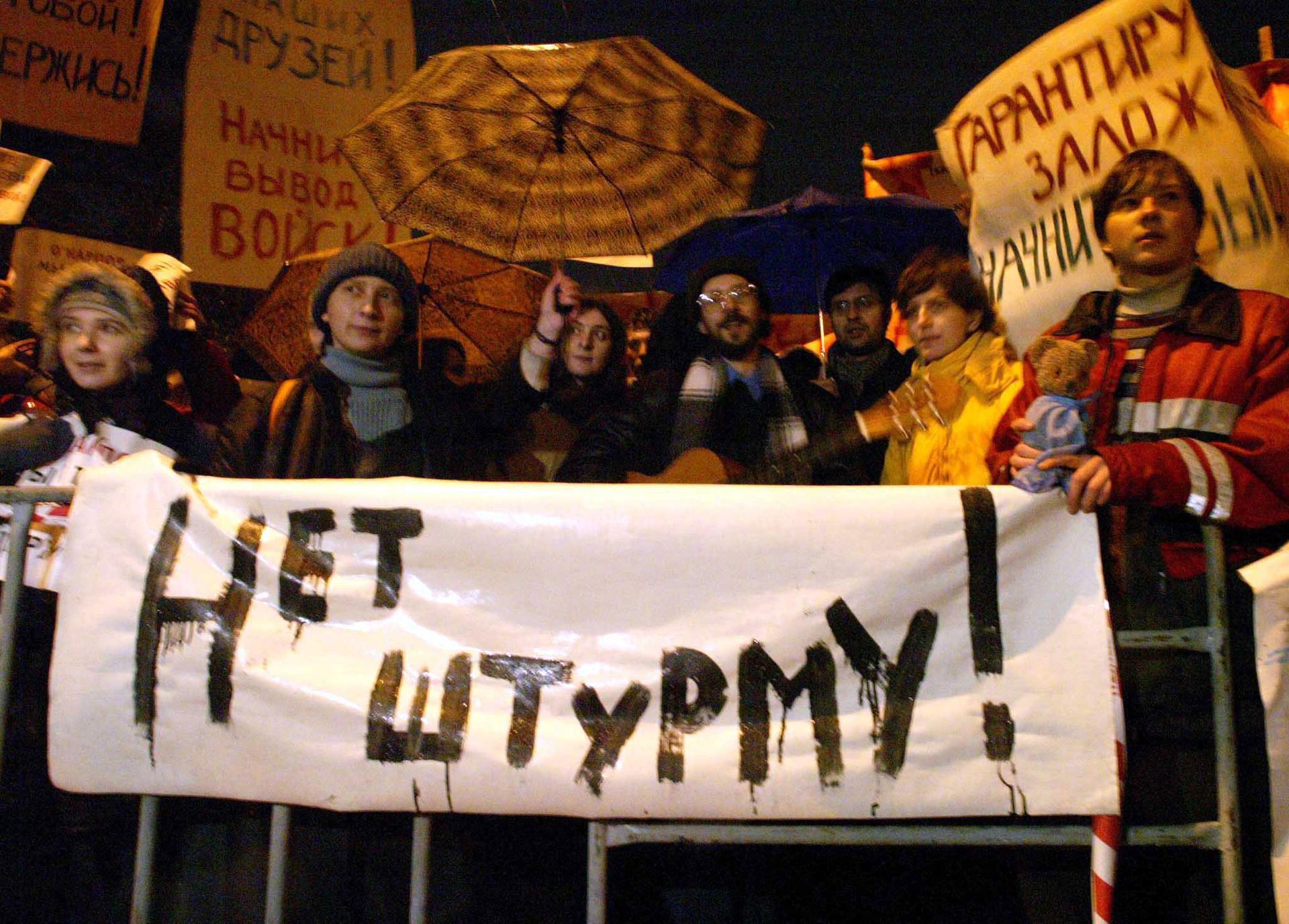
A group of some 40 armed Chechen militants seize the Dubrovka Theater in Moscow, threatening to blow it up unless Putin withdraws troops from Chechnya. At least 850 people are held hostage. After a three-day standoff in which two female hostages are killed, Russian forces pipe toxic gas into the theater, killing the 41 attackers and at least 129 hostages. Controversy surrounds the botched rescue.
youtube://v/d1lvbHUpVmoBeslan school siege
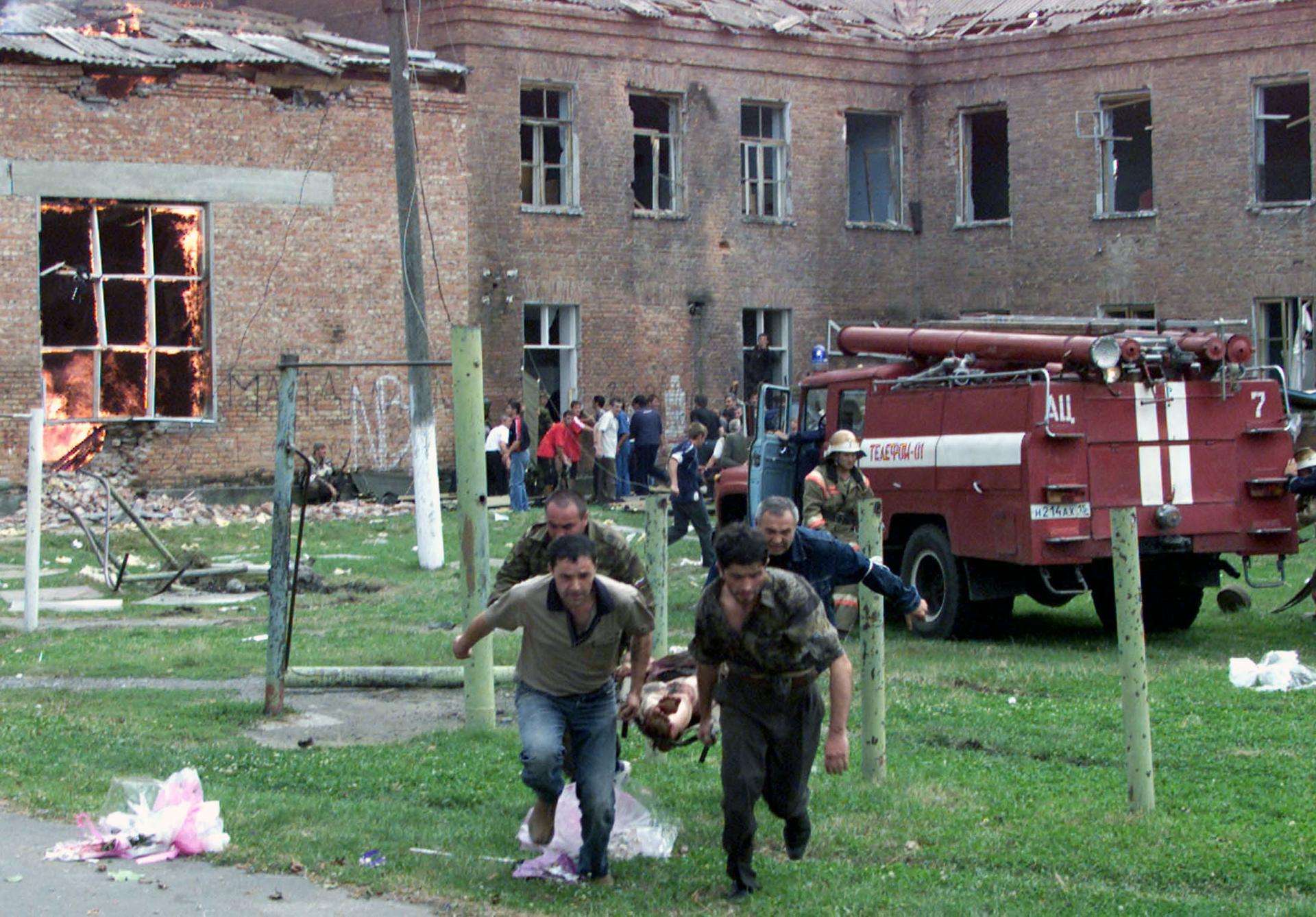
The first day of school in Russia is something of a holiday, as students arrive in their best clothes bearing flowers for their teachers. But on Sept. 1, 2004, armed Islamist extremists seize School Number One in Beslan, in the North Ossetia region of Russia, demanding Russia remove forces from Chechnya and recognize the separatist region’s independence. Radical Chechen warlord Shamil Basayev orders the attack, but Chechen rebel leader Aslan Maskhadov denounces the move. The extremists hold more than 1,100 hostages over three days, until Russian forces storm the building. More than 300 people are killed. Only one hostage taker is captured alive, Nur-Pashi Kulayev, who is sentenced to life in prison in 2006. Putin and the government are criticized for refusing to negotiate and for triggering explosions that kill many, including 186 children. The European Court of Human Rights rules that Russia “failed” in its handling of the crisis.
Illarionov, Putin’s economic adviser at the time, said he couldn’t deal with the consequences.
“[It was a] very clear demonstration of … what is important and what’s not important,” he said. “Regardless of how important economics [are], human lives are much more important. So that is why that was absolutely critical decision for me. And personally, I could not work anymore for the person who gave such an order.”
Illarionov resigned a year later.
At a press conference in 2005, he said that Russia was no longer a “free country,” citing a report by the Freedom House, and that the country had “radically changed.”
He’s now a senior researcher at The Cato Institute, a libertarian think tank in Washington.
youtube://v/BRrilhs6zNMGeopolitical disaster of the century?
On April 25, 2005, Putin goes on national television in his state of the nation address, calling the collapse of the Soviet Union the “major geopolitical disaster of the century.” This sparks debate across the world. Just a few months later in June, the channel Russia Today (now RT) is launched. “It will be a perspective on the world from Russia,” Margarita Simonyan, head of the channel, told reporters. Widely seen as a propaganda channel, Russia Today is accountable to its major funder — the Kremlin.
Journalist Anna Politkovskaya is murdered
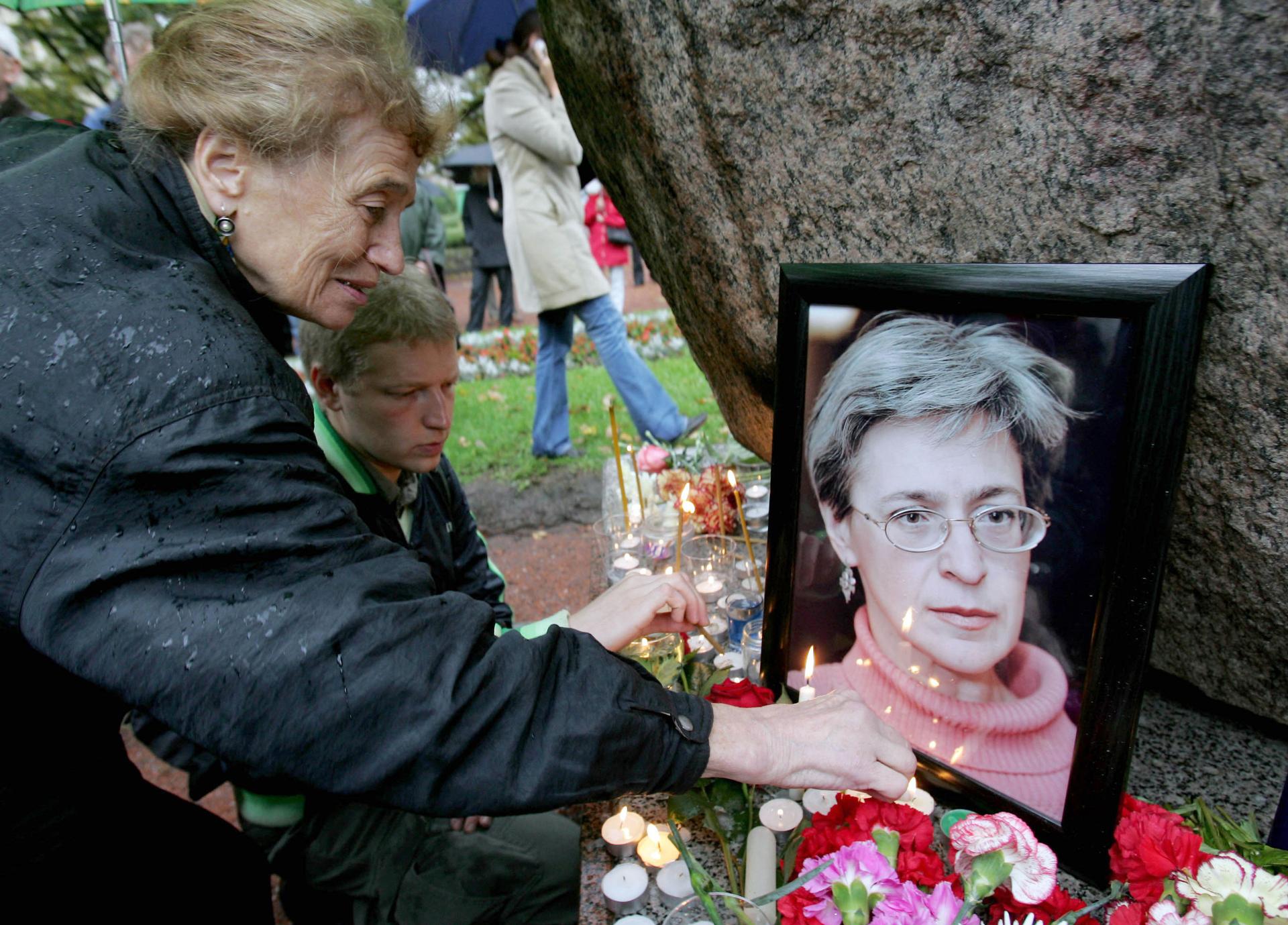
Investigative reporter Anna Politkovskaya is found shot in her apartment building on Oct. 7, 2006. Politkovskaya covered the Second Chechen War and the Moscow theater crisis for well-known Russian newspaper Novaya Gazeta. Politkovsakya suffered previous attacks: In 2004, she is en route to cover the Beslan crisis when she faints, which she attributes to being poisoned. Five men are convicted of her murder in 2014, including three who had been acquitted in a previous trial, but it is still unclear who ordered or paid for the assassination.
youtube://v/XurgeQOFSf0Putin switches with Medvedev, 2008 edition
With constitutional limits preventing a third consecutive term as president, Putin names Dmitri Medvedev as his preferred successor to take over as chief executive. Medvedev wins with 70% of the votes. But despite the switch, Putin is still at the helm. According to a 2009 Levada Center poll, more than 60% of Russians believe Putin and his circle “still hold all the power in the country.”
War in Georgia
In August 2008, tensions between Georgia and Russia over breakaway territories Abkhazia and South Ossetia boil over into a hot war. Both sides blame the other for provoking the conflict and an information war plays out in tandem. The conflict comes after months of buildup and Georgia’s push to move toward eventual NATO membership. Some have also called the five-day war a proxy conflict between the West and Russia.
Bolotnaya Square protests 2011-2013
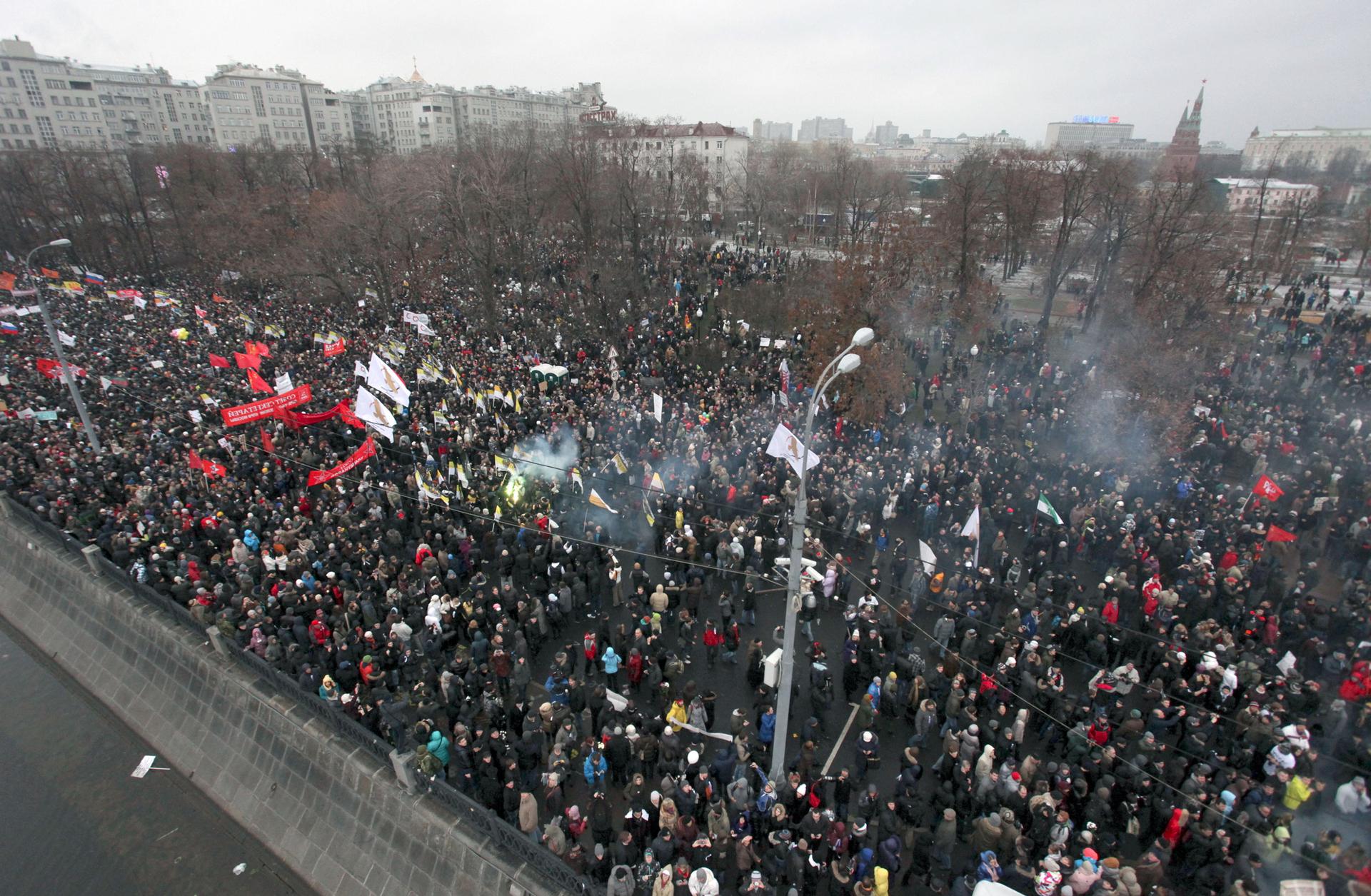
Tens of thousands fill the streets in Moscow and other Russian cities in December 2011. “In Moscow, the police estimated the crowd at 25,000, though organizers said there were more than twice that many. The government calculated that it had no choice but to allow the events to unfold and granted a license,” reports The New York Times. Crowds are angered by alleged election fraud by Putin’s United Russia party in parliamentary elections. In May 2012, protesters gather the day before Putin’s third inauguration as president.
On. Feb. 21, 2012, Russian feminist punk rock group Pussy Riot stages a performance inside Moscow’s Cathedral of Christ the Savior. The group says it is protesting the church’s support for Putin.
youtube://v/grEBLskpDWQDemonstrations continue through July 2013, when thousands protest opposition leader Alexei Navalny’s five-year prison sentence for embezzlement.
Putin switches with Medvedev, 2012 edition
Putin and Medvedev flip roles in 2012, as Putin reassumes the presidency after winning more than 60% of the vote. While Medvedev and Obama have a comparatively productive relationship, Putin strikes a more negative tone with his American counterpart. His reelection also follows a decision to extend the presidential term from four to six years, and sparks large, anti-Putin protests before and after the elections.
Sochi Olympics 2014
The Sochi Olympics are a hard and soft power play for Russia, as Putin hopes to recast Russia as “a strong, stable, modern and gracious” country through the success of the games. But the buildup to the games is also marred by security concerns and human rights abuses, as much of the infrastructure is built under brutal labor conditions and in the shadow of Russia’s anti-gay propaganda law. The games also serve as a distraction from the conflict brewing in Ukraine.
Putin seizes Crimean peninsula
Armed “little green men” appear in Crimea, Ukraine, seizing control of key buidlings just days after the close of the 2014 Olympics in Sochi. Initially, Putin denies that the gunmen wearing uniforms without insignia are under his orders, though later he claims them as Russian troops. An internationally condemned referendum on the annexation of Crimea is held March 16, 2014, and Putin announces the annexation of the Crimean peninsula — shattering his relationship with the West and violating the Budapest Memorandum. A military conflict between Ukrianian forces and pro-Russian separatists also begins in eastern Ukraine, and in July, a Russian-made Buk missile shoots down a Malaysia Airlines passenger plane over the territory. The hot war in Ukraine continues into 2019.
youtube://v/l10BsQzOGKMBoris Nemtsov shot and killed
Boris Nemtsov, Russian opposition leader and once contender for the presidency, is shot and killed near the Kremlin on Feb. 27, 2015. Russian authorities investigate Chechen rebels as suspects in the murder, but the poltician’s daughter, Zhanna Nemtsova, accuses Putin of being politically responsible. Nemtsov had been a powerful political opponent of Putin’s and worked to expose Russia’s secret military campaign in eastern Ukraine.
Russian military intervention into war in Syria
Russia steps up its military involvement in the Syrian civil war in 2015 with airstrikes in support of Syrian leader Bashar al-Assad. While Putin declares Russia’s main goal is to destroy ISIS, Russian intervention also turns the tide of the conflict in Assad’s favor and increases Moscow’s influence in the region. Russia’s action in the region also draws international condemnation and accusations of possible war crimes.
Russia meddles in US elections
US authorities suspect Russian interference in the US 2016 presidential elections, prompting a yearslong investigation by US Special Counsel Robert Mueller. In 2018, a Russian internet agency and more than a dozen Russians are charged with interfering in the US election campaign from 2014 through 2016 in a multipronged effort with the aim of supporting then-businessman Donald Trump and disparaging his rival Hillary Clinton. Russia denies interfering in the election and Trump denies any collusion by his campaign, though the Mueller report, released in April 2019 shows “evidence of numerous links” between officials working on Trump’s presidential campaign and individuals “having or claiming ties to the Russian government.”
Putin pushes a conservative social agenda
Russia’s “gay propaganda law” passes on June 11, 2013, and Putin signs it into law on June 30. The law is officially “for the Purpose of Protecting Children from Information Advocating for a Denial of Traditional Family Values,” but it bans any distribution of “non-traditional sexual relationships.” The law is criticized by groups such as the UN and the Human Rights Campaign. The law is in step with increasing social conservatism in Russia in the wake of Putin’s return to the presidency in 2012.
In 2017, Russia decriminalizes some instances of domestic violence, despite high rates of abuse in the family. Some 12,000 women die annually because of domestic violence, reports RIA Novosti, a Russian news site. The law is proposed by conservative lawmakers who oppose state intervention in family life and argued that the previous law could be used to punish parents for using corporal punishment.
Skripal poisoning
Former Russian military officer Sergei Skripal and his daughter, Yulia, are found unconscious on a bench in Salisbury, England, on March 4, 2018, victims of a toxic nerve gas attack. Both are hospitalized. On March 12, Prime Minister Theresa May says it was likely that Russia was behind the attack: “Either this was a direct act by the Russian State against our country. Or the Russian government lost control of this potentially catastrophically damaging nerve agent and allowed it to get into the hands of others,” she tells the House of Commons. Russia denies any responsibility. The UK, the US, the EU and Canada collectively expel more than 100 Russian diplomats; Russia expels Western diplomats in return.
Putin wins a fourth term
Putin decisively wins a fourth term, netting a 76.7% share of a vote that also saw increased voter turnout. Opposition activists point at some possible cases of vote rigging. During the months leading up to the election, leading opposition candidate Alexei Navalny is barred from running.
The real winner of the 2018 World Cup? Russia’s image.
Russia receives high praise for hosting the 2018 World Cup. FIFA president Gianna Infantino says 2018 was “the best World Cup ever” and the BBC’s Steve Rosenberg writes, “Russia has come across as friendly and hospitable: a stark contrast with the country’s authoritarian image. All the foreign fans I have spoken to are pleasantly surprised.”
Putin’s hold on power continues
In 2019, Putin continues to hold a tight grasp on freedom of expression in Russia, detaining hundreds of demonstrators at the recent protests on the Moscow municipal elections.
“He has managed to create a system where the people who surround him are all dependent on him,” Stent said. “They’re dependent on him for their jobs, for the assets that they have.”
There are various speculations as to what Putin will do after his fourth term ends in 2024. Illarionov said Putin can’t leave because it’s become personal.
“He has put himself into [a dead end],” he said. “He could not leave the top position of the Russian power. Regardless how that the position would be called — president, prime minister, national leader, national führer, or whatever. So he just cannot leave and it’s not because nobody allows him to do it. No, from his personal psychology he’s saying that [if he leaves] the position, it would be extremely dangerous for him.”
But Putin may already have his next move calculated. Stent, a former national intelligence officer for Russia and Eurasia at the National Intelligence Committee, says that Putin takes lessons from judo, his favorite martial arts sport, into the political playing field.
“Even if you’re physically weaker than your opponent, you can take advantage of that distraction of their own weaknesses and move in while they’re not paying attention. And I think Putin has been very good.”
Update: Preparing for a constitutional coup?
Putin proposed constitutional changes on Jan. 15, 2020, that would give him scope to extend his grip on power after leaving the presidency, and picked a new prime minister after Dmitry Medvedev and his cabinet stepped down. Most importantly, Putin suggested diminishing the powers of the presidency and beefing up those of the prime minister.
The dramatic moves were widely seen as preparing the ground for 2024, when Putin, now 67, is obliged to leave the presidency after occupying the Kremlin or the prime minister’s job continuously since 1999.
His proposals, which he suggested should be put to a referendum, would give him the option of taking an enhanced role as prime minister after 2024 or a new role as head of the State Council, an official body he said he was keen to build up. He could even become the speaker of a new, supercharged parliament.
Under the current constitution, which sets a maximum of two successive terms, Putin is barred from immediately running again, but his supporters find it hard to imagine Russian political life without him.
Next: A generation who has grown up under President Putin begins to take its place in Russian politics.
The World’s Indra Ekmanis and Alex Newman contributed to this report. Reuters contributed reporting.
